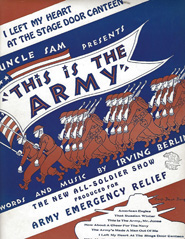
Irving Berlin was an American composer and lyricist. His music forms a large part of the Great American Songbook. Berlin received numerous honors including an Academy Award, a Grammy Award, and a Tony Award. He also received Presidential Medal of Freedom from President Gerald R. Ford in 1977. Journalist Walter Cronkite stated he "helped write the story of this country, capturing the best of who we are and the dreams that shape our lives".

Yaphank is a hamlet and census-designated place (CDP) in Suffolk County, New York, United States. The population was 5,945 at the time of the 2010 census.

Holiday Inn is a 1942 American musical film starring Bing Crosby and Fred Astaire, with Marjorie Reynolds, Virginia Dale, and Walter Abel. It was directed by Mark Sandrich with music by Irving Berlin. The composer wrote twelve songs specifically for the film, the best known being "White Christmas". The film features a complete reuse of the song "Easter Parade", written by Berlin for the 1933 Broadway revue As Thousands Cheer and used as a highlight of the 1948 film Easter Parade, starring Astaire and Judy Garland. The film's choreography was by Danny Dare.
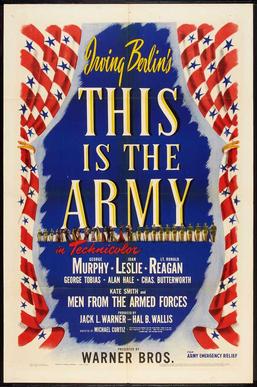
This Is the Army is a 1943 American wartime musical comedy film produced by Jack L. Warner and Hal B. Wallis and directed by Michael Curtiz, adapted from a wartime stage musical with the same name, designed to boost morale in the U.S. during World War II, directed by Ezra Stone. The screenplay by Casey Robinson and Claude Binyon was based on the 1942 Broadway musical written by James McColl and Irving Berlin, with music and lyrics by Berlin. Berlin composed the film's 19 songs, and sang one of them.

Yip Yip Yaphank is a 1918 musical revue by Irving Berlin. He wrote and produced the show during World War I, after he was drafted into the United States Army and was serving in 152nd Depot Brigade at Camp Upton in Yaphank, New York. The military revue was performed by the soldiers of Camp Upton. It moved to Broadway after a brief tryout at the camp.


Babes on Broadway is a 1941 American musical film starring Mickey Rooney and Judy Garland and directed by Busby Berkeley, with Vincente Minnelli directing Garland's big solo numbers. The film, which features Fay Bainter and Virginia Weidler, was the third in the "Backyard Musical" series about kids who put on their own show, following Babes in Arms (1939) and Strike Up the Band (1940). Songs in the film include "Babes on Broadway" by Burton Lane (music) and E.Y. "Yip" Harburg (lyrics), and "How About You?" by Lane with lyrics by Ralph Freed, the brother of producer Arthur Freed. The movie ends with a minstrel show performed by the main cast in blackface.
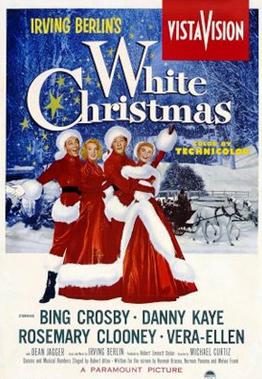
White Christmas is a 1954 American musical film directed by Michael Curtiz and starring Bing Crosby, Danny Kaye, Rosemary Clooney, and Vera-Ellen. Filmed in Technicolor, it features the songs of Irving Berlin, including a new version of the title song, "White Christmas", introduced by Crosby in the 1942 film Holiday Inn.
Harry Akst was an American songwriter, who started out his career as a pianist in vaudeville accompanying singers such as Nora Bayes, Frank Fay and Al Jolson.

As Thousands Cheer is a revue with a book by Moss Hart and music and lyrics by Irving Berlin, first performed in 1933. The revue contained satirical sketches and witty or poignant musical numbers, several of which became standards, including "Heat Wave", "Easter Parade" and "Harlem on my Mind". The sketches were loosely based on the news and the lives and affairs of the rich and famous, as well as other prominent personalities of the day, such as Joan Crawford, John D. Rockefeller Jr., Noël Coward, Josephine Baker, and Aimee Semple McPherson.
Margaret E. Lynn formalized U.S. Army entertainment, beginning in Korea in the 1950s. Building on the tradition of Civil War camp shows, and a military show Yip Yip Yaphank created by Irving Berlin as a soldier in World War I, she eventually developed the U.S. Army Entertainment program, inspiring, supporting, and coordinating theatrical and music programs at Army bases worldwide.
"Easter Parade" is a popular song, written by Irving Berlin and published in 1933. Berlin originally wrote the melody in 1917, under the title "Smile and Show Your Dimple", as a "cheer up" song for a girl whose man has gone off to fight in World War I. A recording of "Smile and Show Your Dimple" by Sam Ash enjoyed modest success in 1918.

"Supper Time" is a popular song written by Irving Berlin for the 1933 musical As Thousands Cheer, where it was introduced by Ethel Waters. The song is about racial violence inspired by a newspaper headline about a lynching.
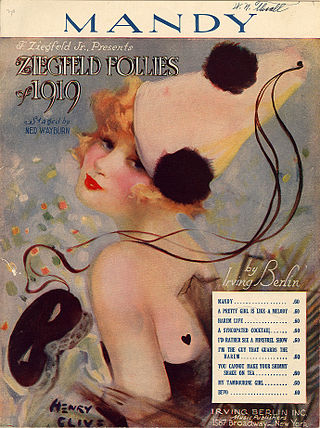
"Mandy" is a popular song by Irving Berlin, published in 1919.

The Lost Battalion is the name given to the nine companies of the US 77th Division, roughly 554 men, isolated by German forces during World War I after an American attack in the Argonne Forest in October 1918. Roughly 197 were killed in action and approximately 150 missing or taken prisoner before the 194 remaining men were rescued. They were led by Major Charles W. Whittlesey. On 2 October, the 77th division launched an attack into the Argonne, under the belief that French forces were supporting their left flank and two American units including the 92nd Infantry Division were supporting their right. Within the 77th sector, some units, including Whittlesey's 308th Infantry, were making significant headway. Unknown to Whittlesey's unit, the units to their left and right had been stalled. Without this knowledge, the units that would become known as the Lost Battalion moved beyond the rest of the Allied line and found themselves surrounded by German forces. For the next six days, suffering heavy losses, the men of the Lost Battalion and the American units desperate to relieve them would fight an intense battle in the Argonne Forest.

Al Jolson was a Lithuanian-American singer, actor, and vaudevillian.
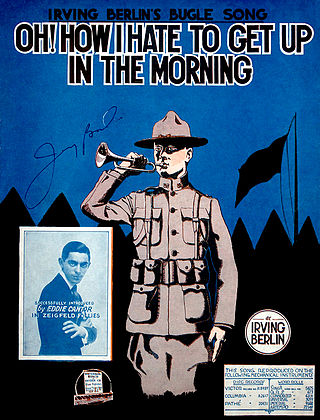
"Oh! How I Hate to Get Up in the Morning" is a song written by Irving Berlin in 1918 that gives a comic perspective on military life. Berlin composed the song as an expression of protest against the indignities of Army routine shortly after being drafted into the United States Army in 1918. The song soon made the rounds of camp and became popular with other soldiers, partly because hatred of reveille was universal.

"A Pretty Girl Is Like A Melody" is a popular song written by Irving Berlin in 1919 which became the theme song of the Ziegfeld Follies. The first verse and refrain are considered part of the Great American Songbook and are often covered as a jazz standard.
Peter L. Feller was an American theatrical set builder who worked primarily on Broadway.
The 152d Depot Brigade was a training and receiving formation of the United States Army during World War I, and was successively commanded by Brigadier Generals George W. Read, John E. Woodward, George H. Estes, George D. Moore, Edward Sigerfoos, and William Jones Nicholson.
